


FY2023




FY2023
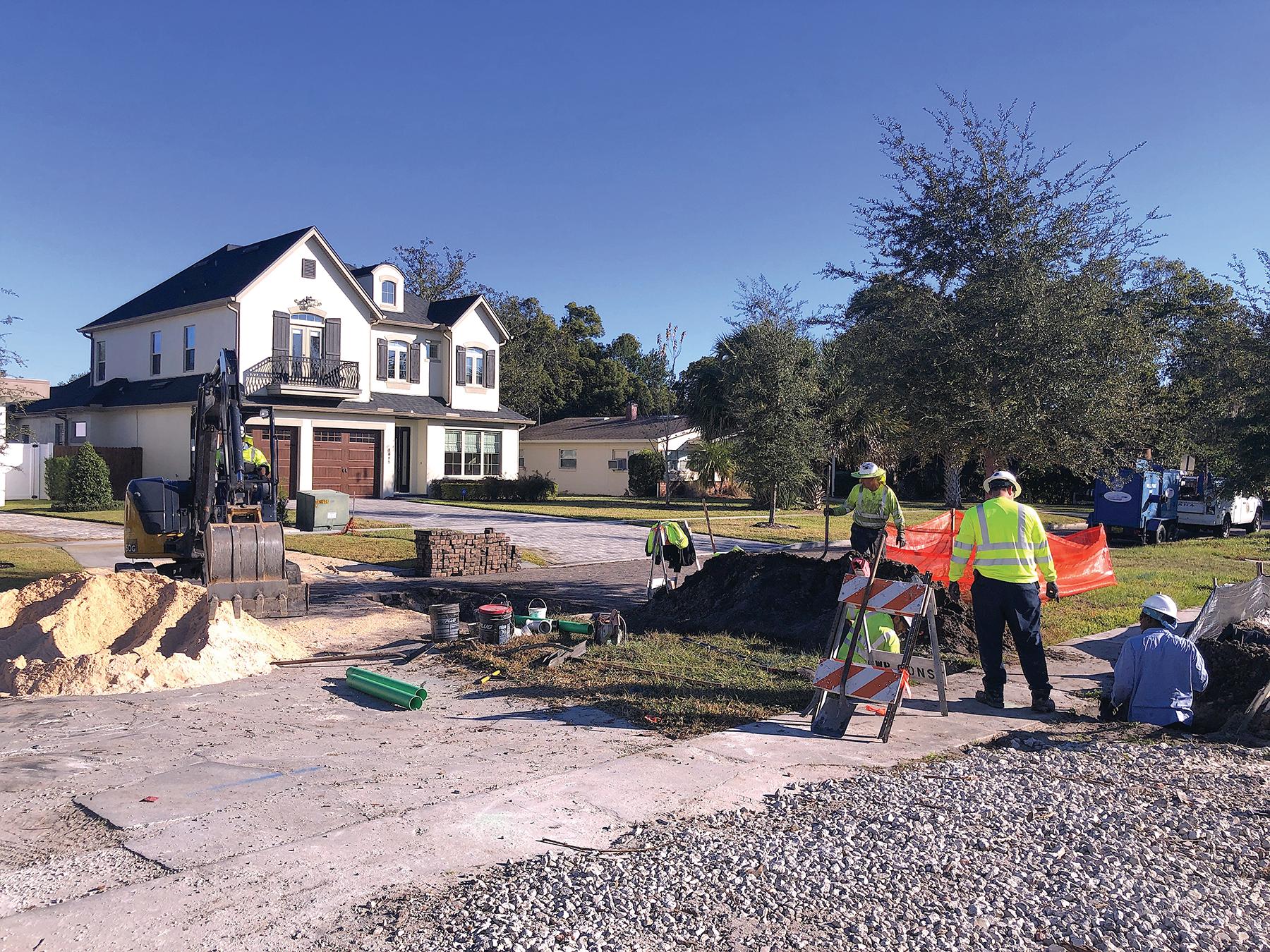
an unaudited summary report of the financial activities of the City of Winter Park, Florida fiscal year ending 09.30.2023
Winter Park is the city of arts and culture, cherishing its traditional scale and charm while building a healthy and sustainable future for all generations.

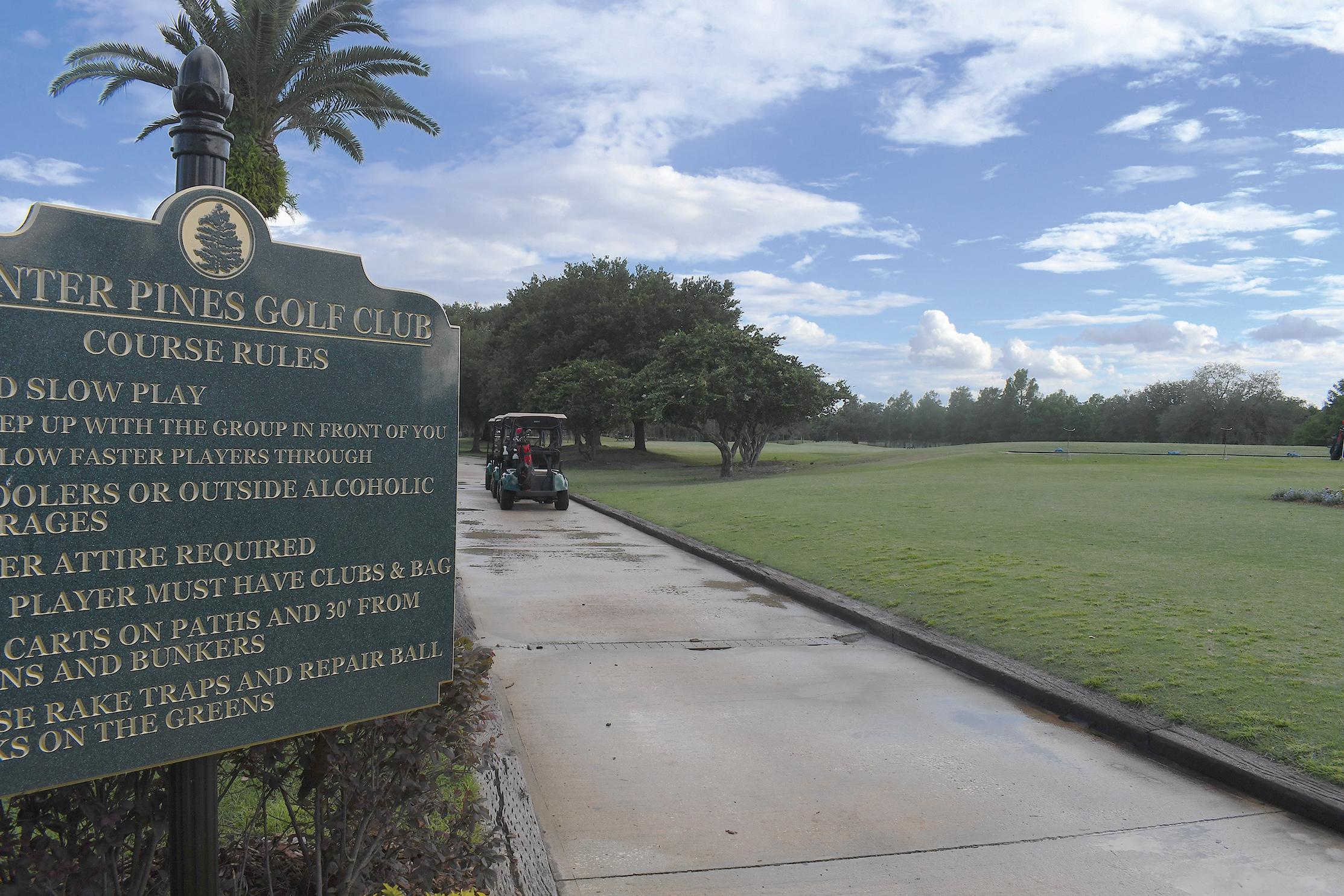


The Popular Annual Financial Report [PAFR] provides citizens and stakeholders with a basic overview of the city’s financial position. The PAFR summarizes and condenses the financial activities of the city’s governmental and business-type activities in a more digestible fashion than the audited Annual Comprehensive Financial Report [ACFR] or budget document from the year prior. Because of this, the PAFR conforms less to generally accepted accounting principles and reporting requirements for government entities. For those interested in reviewig the ACFR, it can be accessed from the Florida Auditor General website via the city’s website at cityofwinterpark.org/departments/finance. Budget documents are also located on this page.
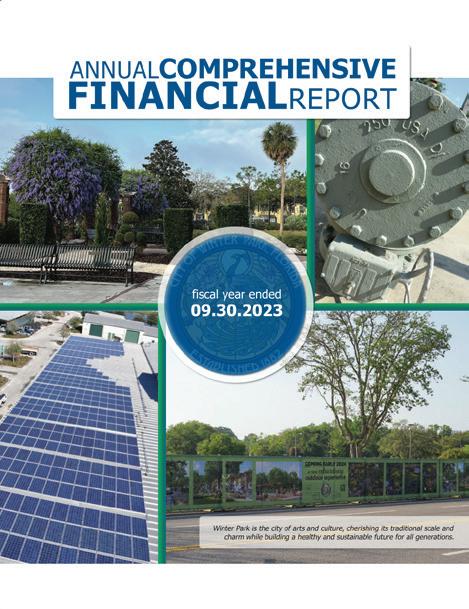

from the city manager
It is my pleasure to present the city’s inaugural PAFR. Also known as the Citizens’ Report, it provides the residents of Winter Park an overview of the city’s revenues, expenditures and other noteworthy indicators such as demographics, housing, capital spending and more, for the fiscal year ending September 30, 2023. The PAFR’s purpose is to summarize in an easy to read context.
We are additionally pleased to share that the city has received the Certificate of Achievement for Excellence in Financial Reporting for over 25 years and are looking to build on this excellence by adding the PAFR to the city’s repertoire of transparent, comprehensive and holistic reporting. Thank you for taking the time to read this report. We welcome the opportunity to answer any questions you might have.
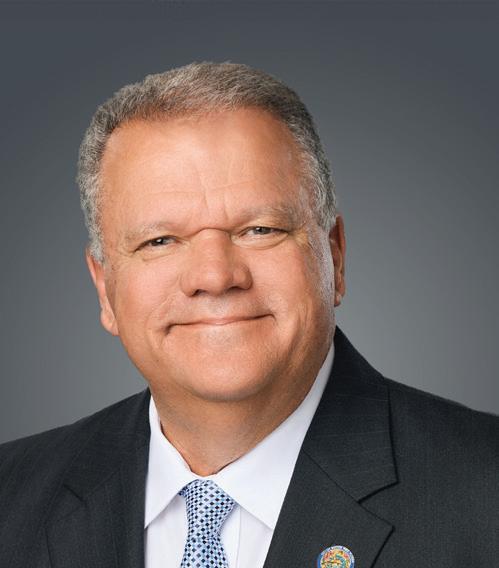
Randy Knight City Manager

Developed in the late 1800s as a winter resort for northerners seeking warmer climates and mild weather, Winter Park has become a thriving community. It is home to 29,795 residents and a popular year-round destination for guests from around the world.
Described by some as a small New England village with a European flavor with quaint shops and scrumptious restaurants, Winter Park is as beautiful as it is unique. In addition to its town-and-gown relationship with Rollins College, the oldest private college in Florida, the city has developed significant partnerships among area businesses, schools, cultural organizations, civic groups and neighborhood associations. Winter Park boasts a favorable taxing structure and one of the lowest property tax rates in the region at just 4.0923 mills.
Winter Park was first chartered in 1887, and the present Commission-Manager form of government was adopted in 1949. The governing body is composed of four Commissioners and a Mayor who are elected for three-year terms by a city-wide non-partisan election.
The City Commission appoints the City Attorney, City Manager and advisory board members. The city is well represented through its 23 boards and committees comprised of volunteer citizens which when at full capacity, houses 161 members all looking to better the community.
The City Manager appoints department heads, subject to Commission confirmation and also approves all other employees. The City Manager is the Chief Executive Officer and is responsible for carrying out Commission policies through the professionally trained and experienced staff.
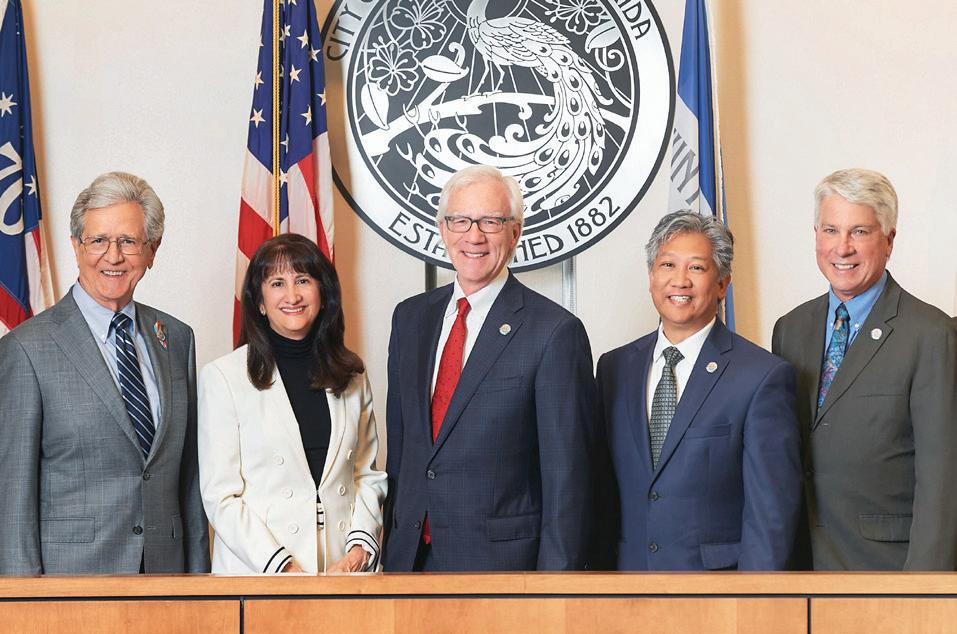
left to right
Commissioner Marty Sullivan
Commissioner Sheila DeCiccio
Mayor Phil Anderson
Commissioner Kris Cruzada
Commissioner Todd Weaver [FY2023]
[FY2023]
listed by their city department liaisons

Building & Permitting Services
Board of Adjustments
Code Compliance Board
Construction Board of Adjustments & Appeals
Communications
Public Art Advisory Board
Information Technology
Broadband & Smart City Ad Hoc Committee
Natural Resources & Sustainability
Keep Winter Park Beautiful (KWPB) & Sustainable Advisory Board
Lake Killarney Board
Lakes & Waterways Board
Office of Management & Budget
Community Redevelopment Agency (CRA)
Board [City Commission + Orange County Rep]
Community Redevelopment Advisory Board
Economic Development Advisory Board
Parks & Recreation
Parks & Recreation Advisory Board
Tree Preservation Board
Winter Pines Golf Course Advisory Board
Planning & Zoning
Historic Preservation Board
Orange Avenue Overlay Appearance
Review Advisory Board
Planning & Zoning Board
Winter Park Housing Board
Public Safety [police & fire-rescue]
Civil Service Board
Winter Park Firefighters’ Pension Board
Winter Park Police Officers’ Pension Board
Public Works & Transportation
Transportation Advisory Board
Utilities Advisory Board
CITYWIDE BUDGET FISCAL YEAR 2023
$198.6 million
GENERAL FUND 30% reserves goal reached
ELECTRIC UTILITY
Winter Park provides a full range of services, including police and fire-rescue; construction and maintenance of streets, sidewalks and infrastructure; engineering; planning and community development; code compliance; general admin, communications and support services; as well as recreational activities and cultural events. In addition, the city operates two enterprises: water & wastewater service as well as electric utility. [Solid waste collection services for the city is contracted with a private firm.]
improvements made to buildings, storm drains, sanitary sewers, community development, etc. | does not include admin & operational costs
minutes police priority 1 calls
AFFORDABLE HOUSING
$320 thousand CRA+city+direct investment
received by call center
$6.7 million undergrounding investment new homes, rehabs & assistance 10.01.2022 thru 09.31.2023
minutes
PUBLIC WORKS
55,000 sq. ft. sidewalks replaced equal to 36 football fields
calls for service WP9 & WP18 89 thousand rounds played at 2 city golf courses
While the city’s population has remained steady, growing less than 1% per year, unemployment came in at 2.1% and median average household income is at just over $93,000. These demographics are also indicative of the diverse employment base that supports the city. MEDIAN AVERAGE HOUSEHOLD INCOME $
October 2022-September 2023
October 2022-September 2023
Winter Park Town Center LTD
[Winter Park Village]
Winter Park Owner LLC
[Bainbridge Apartments]
BCDPF JUNO Winter Park LLC
[Broadstone Apartments]
Holt Properties LLC & Langford RCI LLC
[Rollins College]
NP Winter Park LLC
[Center of Winter Park Shopping Center]
Mayflower Retirement Center, Inc.
Winter Park Town Center Development LLC [Paseo Apartments]
IVT Lakeside Crossing Winter Park LLC
Westmount at Winter Park LLC [Lee Road Apartments]
Village Lane Property LP
[Winter Park Village Apartments]
$673million
Source: Orange County Property Appraiser’s Office
Winter Park is the city of arts and culture, cherishing its traditional scale and charm while building a healthy and sustainable future for all generations.
This guiding statement helps shape the policies, strategy and actions developed by the city.
Exceptional Quality of Life
Intelligent Growth & Development
Fiscal Stewardship
Public Health & Safety
Public Assets & Infrastructure Investment
Every city department contributes to achieving these core objectives. Through strategic planning, goal setting, benchmarking and hard work, city staff uses these guides to carry out and implement the budget, approved by the City Commission each year.
Capital Improvement Plan (CIP) projects cover larger, long-term investments in facilities and infrastructure. A project can be an addition of a permanent structural change or the restoration of some aspect of a property that will either enhance the property’s overall value, prolong its useful life, or adapt it to new uses.
Examples include construction of transportation, stormwater, water and wastewater projects, along with buildings such as fire stations, libraries and recreation centers. These investments can often take more than a year to complete and their costs may be distributed over time.
Please note the city’s FY2023 projects that have been highlighted on the following page.
[FY2023]*
Shady Park spray ground removal in anticipation for new upgrades
Dinky Dock Park renovations
Mead Botanical Gardens capital improvements including addition of new pavilion
cemetery & golf storage improvements
public facility solar awning project
Fire-Rescue Station 61 physical improvements
Central Park Main Stage final improvements
Seven Oaks Park construction investment [not including design]
Information Technology infrastructure upgrades
stormwater infrastructure improvements
Martin Luther King, Jr. Park improvements
Golf Course [WP9] & Pines Golf Club [WP18] minor improvements
Ironbridge wastewater treatment facility [shared with Orlando] improvements
public facilities replacement & repairs
sewer mains rehabilitation
water mains replaced
water & wastewater treatment plants improvements
Showalter Stadium & Ward Park reinvestment
new fire training facility on land contributed to the city
electric utility lines undergrounding $50,000 111,416 119,134
416,176 651,452 874,877 1,054,040 1,157,393 1,158,295 2,424,056 7,459,481
*does not include contractual services, small equipment & general operations costs
FUNDING TOTAL $17,132,424
The city’s 13 departments work diligently across its organization to better improve the infrastructure, utility and level of service for the citizenry in which its serves. The list below provides highlighted capital expenditures for physical improvements to the city, not including operations, to showcase the volume and dedication to investment, ensuring the city’s commitment to a high level of service.
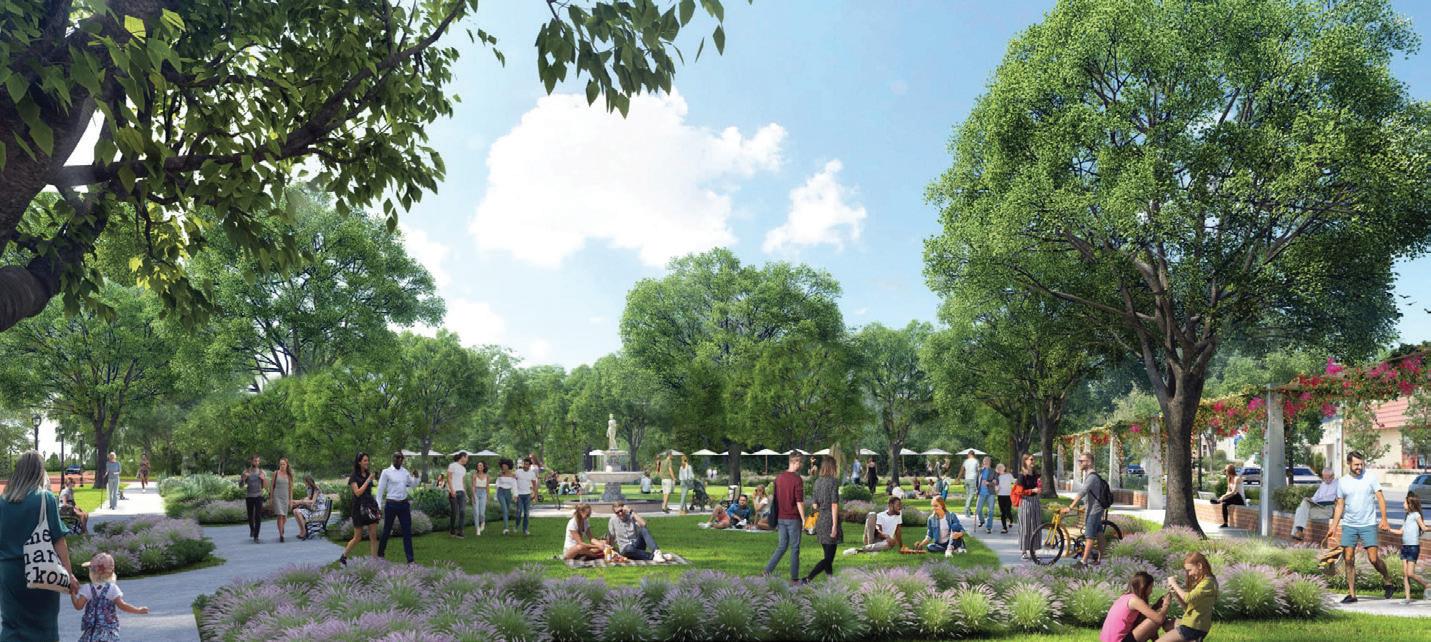
Work began in 2022 on this new park at Orange Avenue and Denning Drive. Funding for this new park will come from the city’s allocation of American Rescue Plan Act dollars. The grand opening of this 2.4-acre park is expected early 2025.


Funded by the city’s Community Redevelopment Agency, this project will bring restrooms in the City Business District that will enhance the experience of the Saturday Farmers’ Market as well as provide a needed amenity for guests.
The city has funded $2.8 million in improvements which include parking and accessibility enhancements at Mead Botanical Garden along with upgrades to fields, accessibility and infrastructure at Ward Park.

Placing overhead power lines underground continues to be a major priority of the city with a goal of completing five miles of undergrounding each year. This effort is being funded by current operating revenues of the electric utility.
The city has adopted a Sustainability Action Plan that calls for reducing greenhouse gas emissions and includes targets of achieving an 80% renewable power supply by 2035 and 100% by 2050. This plan also calls for periodic evaluation of the feasibility of reaching these targets without allowing the city’s electric rates to exceed 105% of the Florida municipal average.
This facility located next to the Winter Park WP9 Golf Course will provide storage and maintenance space for all downtown parks and greenspaces.
Property was contributed to the city which will be used to add a new fire training facility off Wymore Road.
The city is in the process of renovating a building located next to the city’s operational compound on Howell Branch Road. The new location will provide adequate office and visitor space to handle all Winter Park’s permitting needs.
The city has four major stormwater studies/evaluations which are anticipated to be completed within the next fiscal year. The first three will be comprehensive studies which will focus on roughly a third, each, of the city’s geographic boundaries. All three of these studies will include coordination with upstream and downstream jurisdictions, as well as with the St. Johns River Water Management District.
At completion, the resulting models will be consolidated into a single urban stormwater model for various types of storm events. This will facilitate easier periodic updates as the city will be conducting ongoing data collection, implementing instrumentation of surface water bodies, and including ongoing public and private land development in its model. The fourth study will be a professional, independent review of the Federal Emergency Management Agency (FEMA) Community Rating System (CRS). This study will evaluate the costs and benefits of the city joining the National Flood Insurance Program and allow the city to make an informed decision about participating in the CRS program.
With 20,000+ members representing federal, state/provincial, and local finance officials, participants are deeply involved in planning, financing and implementing thousands of governmental operations in each of their jurisdictions. GFOA’s mission is to advance excellence in public finance.
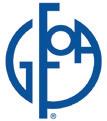
Distinguished Budget Presentation Award

$119thousand grant
The Community Development Block Grant Program supports community development activities to build stronger and more resilient communities by addressing infrastructure, economic development projects, housing rehabilitation, homeowner assistance, etc.
$4million grant
The NRCS vision is a world of clean and abundant water, healthy soils, resilient landscapes, and thriving agricultural communities through voluntary conservation.


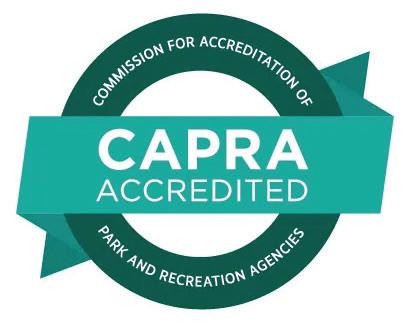
CAPRA is the only national accreditation of park and recreation departments and a valuable measure of a department’s overall quality of operation, management and service to its community. It is considered the gold standard.

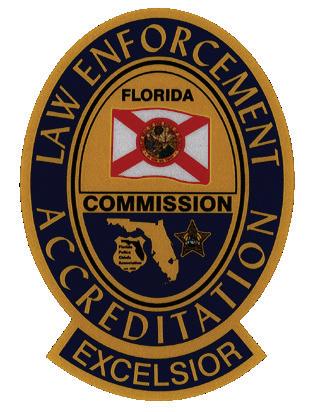
The city’s Fire-Rescue and Police departments both carry exemplary accreditations.
Fire-Rescue maintains premier status through its dual-accreditation with the Commission on Fire Accreditation
International and Commission for Accreditation of Ambulance Services, as well as a Class 1 rating through the Insurance Service Office.
Police holds the honorary distinction of EXCELSIOR recognition through the Florida Department of Law Enforcement.
n The GENERAL FUND is the primary operating fund that supports the majority of operations to residents, businesses and guests. This includes service and operations for all 13 departments including salaries/benefits, capital outlay, transfers and nondepartmental uses such as non-profit support.
n The SPECIAL REVENUE FUNDS account for specific revenue sources that are restricted by law or administrative action to expenditures for specific purposes.
n The DEBT SERVICE FUND is designed to holds funds to pay for principal and interest for long-term debt.
n The CAPITAL PROJECTS FUNDS include money for major projects such as roads, parks and general “brick and mortar” obligations.
n The ENTERPRISE FUNDS account for revenueproducing operations with charges to customers for sales and services, such as utilities. The Enterprise Funds consist of the electric services and water & sewer funds.
n The INTERNAL SERVICE FUNDS are established for the financing of goods or services provided by one department to other departments within the city on a
basis.
The city is required to account for its finances using fund accounting. This method separates revenues and expenses into different funds based on the source of the revenue and intended use. The most notable is the city’s general fund. These include property taxes, utility taxes, franchise fees, licenses & permits, intergovernmental revenues, charges for services, fines, transfers and other revenue. Expenditures for these items are broken down on the next page.

The largest increase in total value was in property taxes at over $2.9 million or 10.5% from last year. Charges for services also saw significant growth from 19% in 2023 and 20% in 2022. Expenditures rose in parks & recreation due to the purchase of the Winter Park Pines Golf Club. Transfers also saw an increase as the uptick out of COVID has grown the total number of Capital Improvement Plan (CIP) projects. Transfers out to the CRA also still remain healthy.







Property taxes account for approximately 43% of the city’s total budget, and is primarily supported by the residential properties in the tax base [80%].
Q How do changes in property values affect my taxes?
A Under Florida law, each year the value of a homesteaded property cannot increase by more than 3% or by the percent change of the Consumer Price Index, whichever is less.
Q How much of property taxes actually go to the City of Winter Park?
A Only 26% of the mills applied for the City of Winter Park are collected for the city.
Q How are property taxes calculated?

A Each taxing authority sets a rate on real and personal property annually, which is expressed in mills. Each ‘mill’ generates $1 for every $1,000 of assessed valuation of taxable property. Here’s a simplified equation to help calculate your property taxes:
How much am I being taxed compared to the region?
A Winter Park has the 2nd lowest millage rate in Orange County. Q Where does my money go for each property tax dollar?
Each dollar gets divided up amongst four agencies



• The Office of Management & Budget and Finance departments develop preliminary revenue estimates.
• City Management prepares proposed budget goals for City Commission review and refinement. Expectations are set.
• Preliminary budget requests are developed with special attention regarding the service level expectations, shared costs, and estimated available resources among all departments.
• Deliver preliminary budget and 5-year Capital Improvement Plan to the Mayor and City Commission.
• Continue gathering resident input.
• The Florida Truth in Millage (TRIM) Bill requires that the proposed millage must be certified to the Orange County Property Appraiser in early August. Before the end of the budget work session, the City Commission agrees on a proposed millage rate for taxing purposes. When the millage certification is delivered to the Property Appraiser, the date, time and place of the first public hearing is provided for advertisement to the residents.
• The city projects revenues based on historical information, estimates of taxable value from Orange County Property Appraiser, projections received by the state as well as projections received from city departments. Revenue sources are compared to the budget requests and adjustments are made based upon review of priorities and the need to provide essential services.
• The city reviews each department budget and gives tentative approval pending review of the overall budget. Any non-profit organization that desires to request city funding support for their activities may apply during this time for funding consideration with the City Manager’s office.
• A balanced budget as required by the State of Florida is produced. A 5-year Capital Improvement Plan and 10-year General Fund, Water Utility, Electric Utility, and CRA projection are also prepared.
required by Florida TRIM Bill
• PH1 “Notice of Proposed Taxes” provided to each property owner by the Orange County Property Appraiser.
• PH2 Public hearing date, time and place is advertised by the taxing agency and must denote any increase in the proposed millage rate over the roll-back millage rate and increases in expenditures [if applicable] from the prior year.
The following financial summary is based upon a condensed view of the city’s assets and liabilities for all governmental and business-type funds as of September 30, 2023.
A statement of net position is a summary of what the city owns (assets) versus what they owe (liabilities). That difference is what is called a net position. Year over year, the city uses this value as an indicator of its financial position and whether it is improving or waning.
Capital Assets Tangible property or equipment used for operations, expected to have a service life of more than three years and a cost of more than $5,000.
Governmental Activities Functions supported by taxes and intergovernmental revenue.
Business-Type Activities Functions that can recover some or all their cost through fees and charges. Examples include electric, water & wastewater.
Net Position The difference between total assets and total liabilities.
Deferred Outflows The depletion of net position that applies to a coming period (expenditure), and does not get applied until a future time.
Deferred Inflows The addition of net position that applies to an upcoming revenue period, and does not get applied until a future time.
The purpose of the statement of activities section presents information regarding the change in the city’s net position during the most recent fiscal year. More plainly, the intent of the report provides for when the transaction occurs rather than when the transaction cash flows giving a different lens to the city’s financial viability.
Revenues include charges for services, operating grants and capital grants.

The revenues of a government other than those derived from and retained in Enterprise and Internal Service funds.
The city is responsible for investing funds until they are needed for paying expenses. In general, the investment philosophy is safety, liquidity and return – in that order of priority.
The city will:
• consolidate cash balances from all funds for investment purposes and allocate investment earnings according to generally accepted accounting principles.
• collect revenues, including past due bills of any type, and may utilize an outside collection agency when deemed appropriate.
• deposit all funds within 24 hours of receipt.
• pay all bills within 30 days of verifying obligation.
The full investment policy can be accessed at cityofwinterpark.org/departments/finance.
The city follows an adopted debt policy when managing or issuing debt. Access the debt policy at cityofwinterpark.org/departments/finance.
35% federal home loan bank
farm credit bank 19 % u.s. treasuries
federal national mortgage association
federal home loan mortgage corp 4% local government investment pools 1% government national mortgage association
TOTAL $99,417,039




obtain voter approval for specific bond types such as general obligation debt.
maintain its net general obligation bonded debt at a level not to exceed 2% of the assessed valuation of taxable property.
maintain or improve its current bond ratings to minimize borrowing costs.
review & evaluate its existing debt obligations annually.
limit the debt level so as not to adversely affect its credit rating.
Governments hold cash in reserve for a variety of reasons. Often money is set aside to prepare for emergencies, such as natural disasters or unrealized revenues. Reserves may also be accumulated to fund specific projects or to position the city to take advantage of matching grants or land purchase opportunities. The city has an aspirational policy goal of reaching fund balance equal to 30% of recurring General Fund expenditures. For FY2023, the city hovered just around this goal. The Commission also has adopted goals for the water and wastewater utility and electric utility.
Winter Park is the city of arts and culture, cherishing its traditional scale and charm while building a healthy and sustainable future for all generations.
As the city continues to diligently balance the multifunctional responsibilities of its roles, including but not limited to:
environmental stewardship
economic growth quality of life
preserving culture & heritage public health & infrastructure
Looking ahead, the city continues to pursue opportunities to reinvest in itself as well as discover new ways to innovate and create value for its residents.
Keep the millage rate the same for FY2024.
Increase capital project spending over all departments.
Increase public safety positions.
Maintain employee service-based organization.
Provide additional funds for community support including the city’s nonprofit partners and city/CRA historic and home rehabilitation programs.
Provide for infrastructure support for
» pavement, bikepath, curbing & brick road repairs
» parks & public facilities improvements
» information technology infrastructure
» water & wastewater, electric utility and energy conservation through natural resources & sustainability
To follow City of Winter Park priorities and actions, please access board meeting agendas at cityofwinterpark.org/meetings.
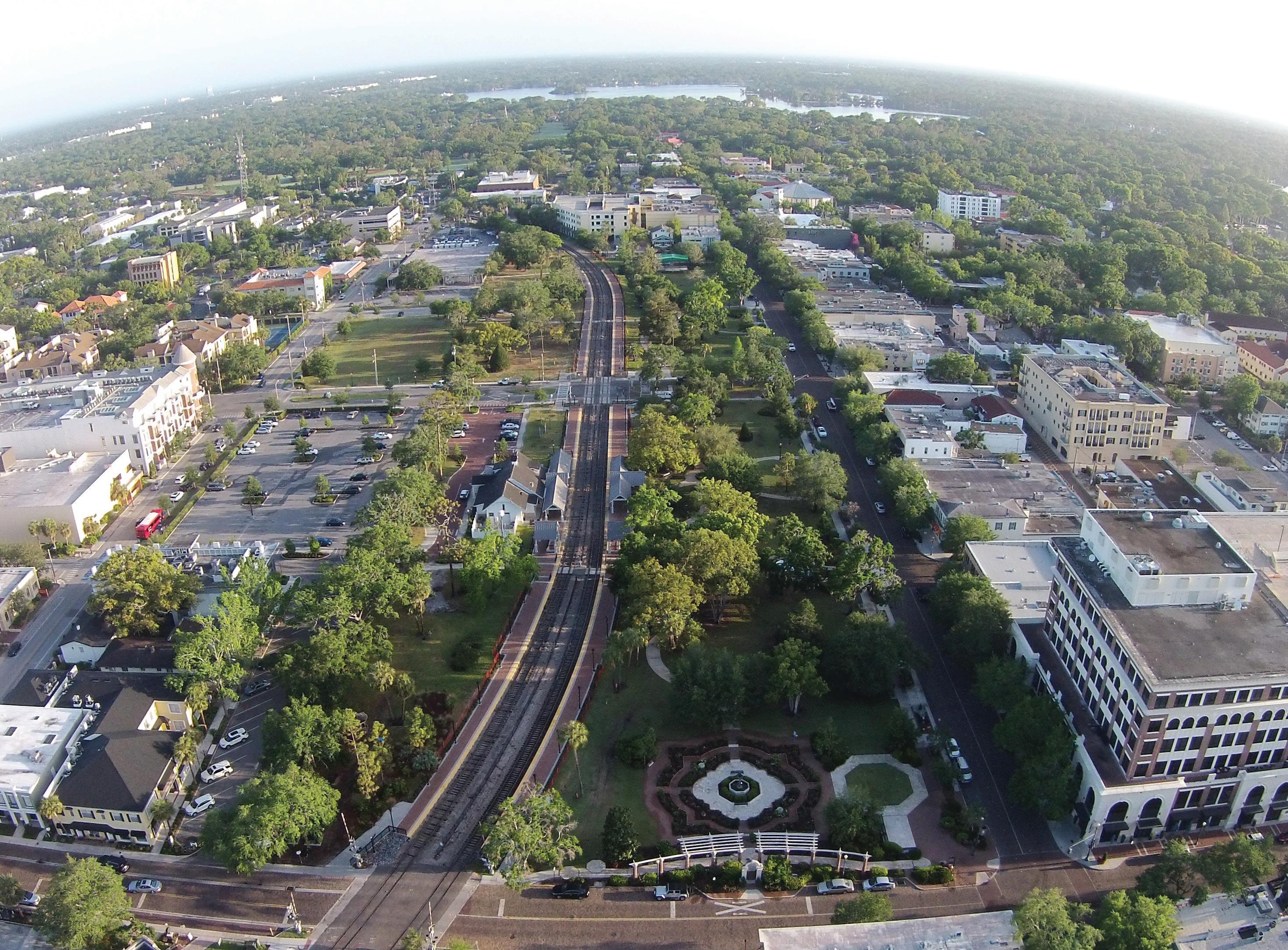
Submit city service requests, report outages, tree & code issues or ask questions.
cityofwinterpark.org/atyourrequest
Purchase daily or annual motor boat permits.
cityofwinterpark.org/boating
ePayments
Make payments online.
cityofwinterpark.org/services under Online Services
Permitting Self Service
Apply for permits, business certificates & tree removals.
cityofwinterpark.org/selfservice
Requests for city-related public information. cityofwinterpark.org/public-records



cityofwinterpark.org/departments/finance fiscal year ending 09.30.2023 access financial reporting documents at FY2023
an unaudited summary report of the financial activities of the City of Winter Park, Florida